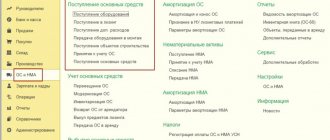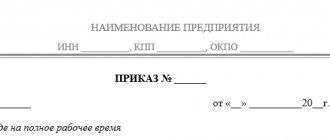general information
In order for an employee to go on vacation, guaranteed to him by labor legislation and lower regulations, orders are used in office work, listed in a unified form in Resolution of the State Statistics Committee of January 5, 2004 No. 1 .
Articles on the topic (click to view)
- Fine for late payment of vacation pay
- What to do with unused vacation
- What to do if your employer does not pay vacation pay
- How long after employment is vacation allowed?
- Is maternity leave taken into account when calculating pensions?
- Accounting for compensation for unused vacation
- Dismissal while on maternity leave
How many days before vacation is a vacation order issued? The document is drawn up in advance, no later than two weeks before the day of the vacation.
This period is stipulated by law so that the employee knows about the impending event in advance and can prepare for it.
It’s better not to wait until the last minute and take care of completing the document in advance.
It is also worth mentioning that payments to the employee are made three days before the upcoming vacation.
The content of the order on granting leave to an employee is unified, which, however, does not prevent organizations from changing its structure and approving it independently within the institution. If only the logic of the order was not violated. As for the rest, the document is open for corrections and changes .
Order form: its preparation and completion
An order is drawn up in a specialized structural unit (usually in the personnel department). Responsibility for its development rests either with an employee of this department or with a person authorized to deal with personnel issues.
During the development of the draft order, we are guided by the following documents:
- An appropriate vacation schedule for the working year (everyone knows its form - No. T-7).
- An employee’s application for annual leave, duly completed.
The details used in the unified form include:
- Employee's full name.
- Employee personnel number.
- Structural subdivision.
- The position held by the employee.
- Type of leave (annual basic paid).
- Type of leave (additional paid).
- Vacation period (from...to).
- Duration of vacation (total in calendar days).
- Vacation start/end date (from...to).
Also, do not forget about such details as the “registration number”, which is placed opposite the name of the type of document.
The document is registered in accordance with the rules established in a particular organization.
An order for annual paid leave is signed by the head of the organization.
The employee is introduced to this document; after the manager’s signature, he must leave his signature.
When filling out the order form, pay attention to the following columns:
- Work period . This phrase refers to a time period that guarantees the employee annual paid leave. Such a period is a working year, calculated from the moment the employee joins the company.
- Duration of annual basic paid leave . The duration of leave is regulated by Articles 115 and 120 of the Labor Code of the Russian Federation. From these articles one can deduce the statutory holiday period of 28 days, and also conclude that there is no upper limit. One more point: weekends do not count towards vacation, but are transferred .
- Duration of annual additional paid leave . Turning to Article 116 of the Labor Code of the Russian Federation, it is important to note: only categories of employees designated by law are entitled to additional leave. More information about these categories can be found in the above article.
- Total duration of vacation . The number of days is indicated, which is the sum of the number of days of main and additional leave (if any).
You can order your vacation here.
This is important to know: Extension of maternity leave
You can find a sample of filling out a vacation order form T-6 here.
Deadlines for issuing an order with a vacation pay schedule
According to the Labor Code, annual paid leave is established according to the schedule at the end of each calendar year . In this case, the employee is notified by notice two weeks before the start of the vacation. If we are talking about extraordinary paid leave, the employee must agree on the date of the leave with the employer no earlier than 15 days before the start of the holiday.
An order for leave is made on the basis of an application. The legislation also does not stipulate the exact deadlines required for its release. The most important thing is that the date of the order must be earlier than the day when the employee goes on vacation.
The Labor Code of the Russian Federation does not stipulate whether it is possible to write an application earlier. The timing of the release of all documents may be stipulated by the company’s internal rules.
It is impossible to foresee everything in advance, just like the dates of your vacation. Knowing the rules for applying for vacations is important for both the employer and the employee. This will avoid any disagreements or litigation.
Do you have a legal question?
We also recommend reading:
Changes
Once a document is approved by the manager, it cannot be changed . Even before the document has acquired legal force, changes can be made to it. But not after publication.
The only possible option in such a situation is to cancel one document and replace it with another . For example, if an employee expressed a reasonable desire to reschedule a vacation in a statement, then the original order is replaced with a new one. The same applies to drawing up a settlement note.
How to correct errors in an order
The document is drawn up in accordance with the rules of office work, so any marks, blots and corrections by hand are unacceptable. In addition, the order is a financial document. Based on the data contained in it, the accounting department will pay vacation pay to the employee and calculate insurance contributions to the budget.
To avoid quibbles from inspection authorities, it is better to redo an incorrect order and re-agreed it.
The corrected version of the vacation order is signed by the same person who approved the previous version.
The planned vacation can be postponed to other dates, canceled, etc. However, the vacation order itself cannot be cancelled.
If the initiator of changing the employee’s rest time is his manager, then the transfer order signed by the director must be agreed upon with the employee.
In the event that an employee himself reschedules his vacation, a statement must be written to the director indicating the reasons and deadlines. It would be useful to attach supporting documents if the reason for the transfer is compelling.
The vacation cancellation order contains the following information:
- on whose initiative the order is cancelled;
- links to the document being canceled (date and order number).
Storage
Vacation orders are stored in the structural units of the organization responsible for personnel management
As a rule, these are personnel services (HR departments).
There, prompt storage of such documents is carried out in special files intended for personnel orders.
In addition, institutions can organize an archive where files from structural divisions should be received.
When drawing up such a document as an order for granting leave, it is important to understand that only the following will protect you from mistakes: careful filling out all the fields of the document , proper execution of all procedures provided for by law and, most importantly, compliance with all deadlines prescribed in the Labor Code of the Russian Federation.
Only by keeping all these teachings in mind can you send an employee on vacation without any problems. Yes, so that the employee does not run to court later!
Didn't find the answer to your question? Find out how to solve exactly your problem - call right now:
Rules for placing a vacation order
Annual paid leave is a constitutional guarantee provided to employees during their work activities. However, full-time employees cannot use their benefits uncontrollably, since the interests of the employer must also be respected.
After all, if janitors, accountants and economists used their right to vacation only at their own request, many companies would cease their activities due to the lack of specialists at work in the summer, the most desirable time of rest for many.
That is why, in order to maintain a balance between the interests and desires of the employer and employees, Article 123 of the Labor Code of the Russian Federation was introduced, according to which a vacation schedule is drawn up in all institutions. The agreed document is approved before 15 of the current year for the next calendar year and includes information on the procedure for using vacation by all full-time employees, indicating the type of vacation and the period of its use in relation to each employee.
In this case, in the process of creating a schedule, the following aspects are taken into account:
- Specifics of the company's work;
- Opinion of the trade union committee;
- Preferential categories with the right to rest at a time convenient for them;
- Personal requests from employees.
In some companies, several rules are also established at the local level regarding the formation of a schedule and the provision of leave. In particular, the same collective agreement may include a condition for granting vacation to no more than 10% of employees of the total number of staff per month or registration of vacation in the summer on a first-come, first-served basis.
The law, while establishing the requirement to approve the priority schedule, does not provide detailed explanations about the procedure for its formation and maintenance, which is why in some companies, the vacation plan contains only an approximate time period, namely, a certain month; in other institutions, the start date of the vacation and its end is specified. This aspect is very important due to the fact that certain legislative rules and possible consequences are associated with the approved date of rest.
Thus, Article 123 of the Labor Code of the Russian Federation states that the future vacationer should be notified in writing about the start time of the annual vacation two weeks before the start of the vacation. If the date in the schedule is specified, counting the two-week period is quite simple. If only a month is indicated, for example, May, it is problematic to track the date of fulfillment of obligations to notify an employee and, accordingly, it is difficult to apply the consequences of failure to fulfill Part 3 of Article 123 of the Labor Code of the Russian Federation.
This is important to know: May or may not the vacation begin on a day off?
And the consequences are defined by law as follows. Based on Art. 124 of the Labor Code of the Russian Federation, the employee receives the right to postpone his vacation to another time convenient for him, but in agreement with management, if the notice is delivered late or in violation of the deadline for its provision. At the same time, the norms of Article 124 of the Labor Code of the Russian Federation are practically not used by workers due to the fact that no one knows how in practice this situation can be implemented to their advantage.
Application deadlines
Any employee can reschedule his planned vacation dates by agreement with the employer. In this case, the basis for granting leave will be his personal statement. The procedure in this case is as follows:
- the employee writes a statement,
- a decree is issued on the employee's leave,
- the manager sends an order to the accounting department to accrue vacation pay,
- At least 3 days before the start of the vacation, the employee is credited with money.
In this case, the employer can establish internal rules of the enterprise, which stipulate the deadlines for submitting all documents from employees.
The law does not stipulate the exact time for filing an application.
When to write a statement
The norms of the Labor Code of the Russian Federation provide for three types of rest for full-time employees of companies, namely:
- Annual;
- Additional;
- Administrative.
The first and second vacations by virtue of Article 114 of the Labor Code of the Russian Federation and Article 116 of the Labor Code of the Russian Federation are paid, the third type of exemption from official duties is provided without pay, although with preservation of the job. At the same time, given that the law provides for different reasons for these holidays, the rules for documenting are also slightly different.
For paid leave
In the usual manner, if the personnel employee clearly complies with the law and the priority schedule contains specific start dates for both the main and additional vacations of employees, a notice of the start and end dates of the vacation is given. The worker reads the document, signs it and returns it to the personnel officer. Based on the notification, an order is issued and compensation is calculated.
However, if the rest schedule does not contain clear vacation dates and is based only on a period equal to a month, according to established practice, an application for vacation is drawn up by the employee based on the rest periods verbally agreed with management, taking into account the specifics of production. An application for leave is also written if an employee requires leave outside of the schedule, for example, due to personal problems or other objective reasons.
In pursuance of Article 123 of the Labor Code of the Russian Federation, the vacation schedule is mandatory for compliance by both management and employees. However, under certain circumstances, changes can be made to the document, which is permitted by law.
In particular, a worker may ask in an application to transfer the vacation to another period for the following reasons:
- Providing a voucher for sanatorium-resort treatment on the recommendation of a doctor;
- To solve family problems, for example, when moving, divorce, or helping a child enroll in a university.
Expert opinion
Novikov Oleg Tarasovich
Legal consultant with 7 years of experience. Specializes in criminal law. Member of the Bar Association.
If the production process does not suffer from the absence of an employee during the proposed period, management, as a rule, agrees to a meeting and, based on the application, provides rest. The statement also serves as the basis for making adjustments to the schedule.
However, in some situations determined by law, the directorate is obliged to postpone the worker’s annual vacation to the period proposed by him. So, by virtue of Article 124 of the Labor Code of the Russian Federation, vacation must be postponed on the following grounds:
- Before holiday under the BiR or immediately after it.
- When rest coincides with a period of illness.
- When an employee performs state or civil duties, such as military training, serving as jurors, members of an election commission, etc.
- If the spouse of a serviceman under a contract requests vacation at the same time as her husband.
- When granting leave to part-time workers.
- Planned professional development at the insistence of management.
- When annual and student leave coincide.
In most cases, main and additional leave are provided together, which is permitted by law. However, in the priority schedule, these types of recreation must be reflected separately, taking into account that the law provides for different reasons for their presentation.
On vacation at your own expense
The procedure for taking leave without saving earnings is regulated by the norms of Article 128 of the Labor Code of the Russian Federation. At the same time, this norm does not provide for the preliminary drawing up of a priority schedule for this type of vacation due to the fact that it is intended to solve family problems, the occurrence of which cannot be foreseen.
This is important to know: Transfer of leave at the initiative of the employer
At the same time, this type of exemption from work duties, depending on the grounds for registration, may or may not be mandatory. In particular, the company management does not have the right to refuse to apply for leave in the following cases:
- To register a marriage;
- When a child is born to an employee;
- In case of death of loved ones.
The directorate is also obliged to issue leave upon request to preferential categories separately defined by law, in particular:
- For pensioners.
- For disabled people.
- Widows of fallen servicemen.
- Part-time workers.
- Single mothers and fathers.
- Parents of children with disabilities.
- Dad and mom raising two or more children.
- Combat veterans.
- Chernobyl survivors.
- Northerners.
- Employees entering the university to take entrance exams.
In other cases, if the worker does not belong to a preferential category or has ordinary family difficulties, administrative leave is issued with the consent of management, taking into account the specifics of the company, based on the application submitted by the employee.
When is a request for vacation at your own expense made?
The employer is not obliged to provide employees with vacation at their expense. This may be a mutual agreement between the parties, subject to good cause . However, the legislation establishes certain categories of citizens who have the right to such rest.
In both cases, the employee must write a statement. There is no unified form for this document, so it can be written either by hand or on a form established by the company’s internal rules.
You can learn more about applying for leave at your own expense in this article.
The legislation does not stipulate the period within which it is necessary to write an application, because unforeseen circumstances can also serve as a reason. At the employer's request, the employee must provide any documents . justifying valid reasons for going on vacation. Registration occurs traditionally:
- The employee draws up a statement indicating the reasons for urgent leave,
- The HR department issues an order under the personal signature of the employee.
Application for vacation at your own expense: .
Rules for notifying an employee
In pursuance of the norms of Article 123 of the Labor Code of the Russian Federation, the directorate of the organization is obliged to notify a full-time employee of the start of vacation 14 days in advance. At the same time, the legislation does not stipulate in detail the procedure for notification; it only states that notification must be made against signature. That is why the procedure can be followed in two ways:
- Draw up a schedule with separate columns for the vacationer’s signature and the date of its entry.
- Approve the notification form and hand it to employees within the period prescribed by law.
As a rule, the first option is not used to avoid controversial situations with regulatory authorities, but the second method is quite common based on comments to Article 123 of the Labor Code of the Russian Federation. At the same time, given that the law does not directly indicate notification by means of a notification, the document form has not been approved by the norms of the Labor Code of the Russian Federation. That is why it is recommended to develop a form yourself and approve it through a local act.
For clear management of personnel records, it is also advisable to keep a log of notifications. Thus, the document will receive an official status and number, and it will also be possible to track the date of its publication and delivery, which in the future will help to defend your position in court in a dispute about violation of the terms of delivery of the form.
Comments on any norm, including the Labor Code of the Russian Federation, are advisory in nature and have no legal force. At the same time, the use of recommendations from lawyers when conducting personnel records is not considered a violation.








